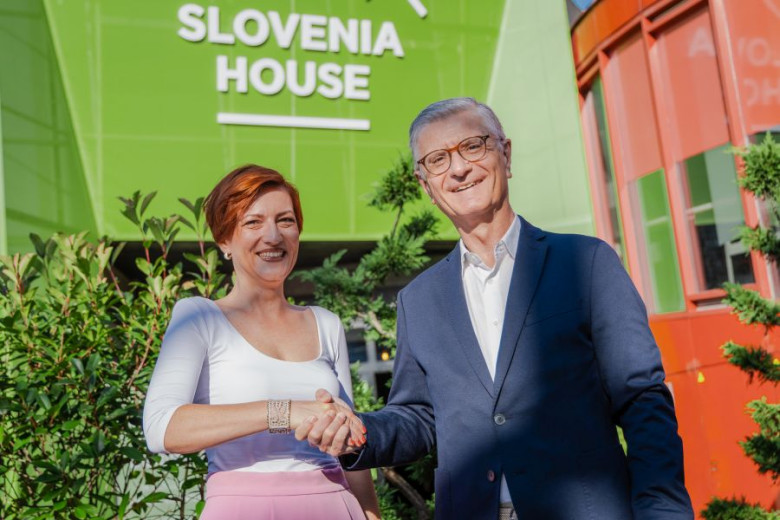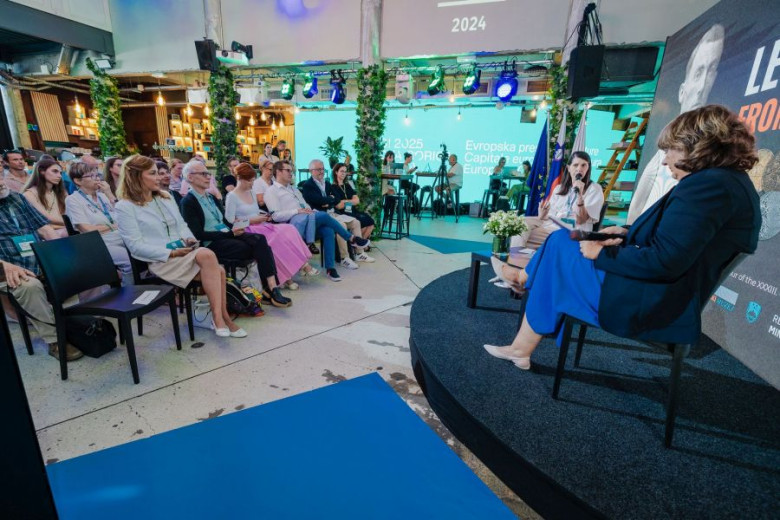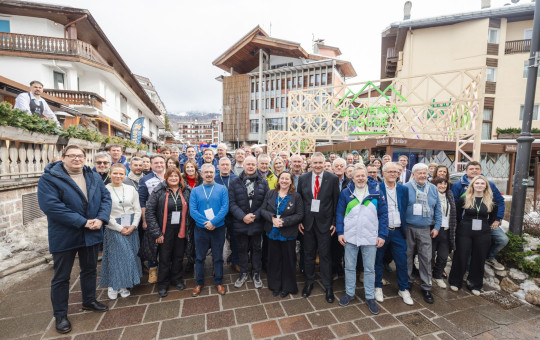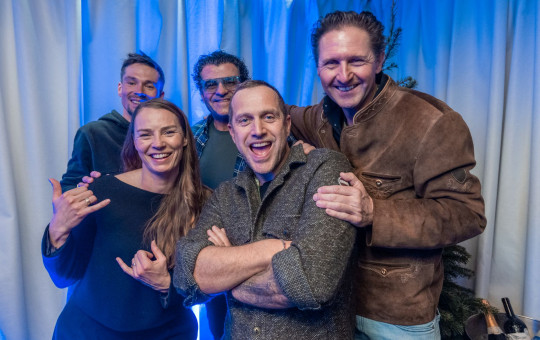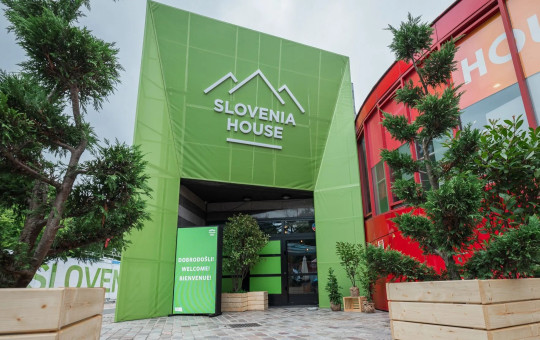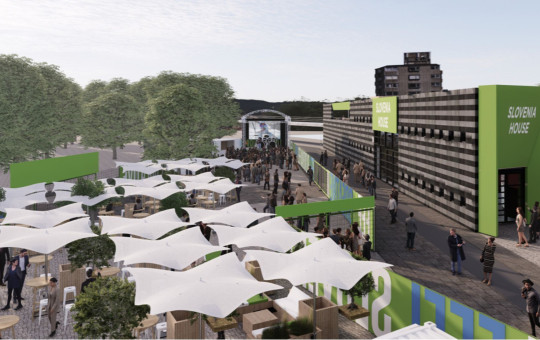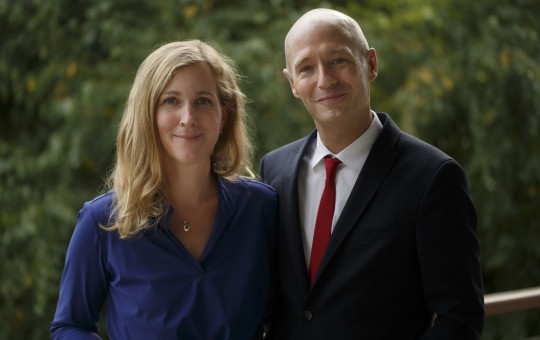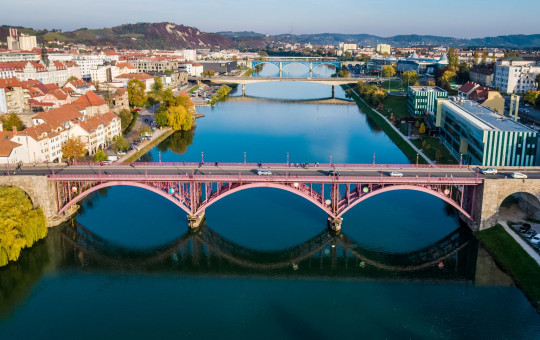Date: 9. August 2024
Time to read: 3 min
The Slovenia House in Paris hosted Slovenian Culture Day. Amidst a lively sports atmosphere, the culture-focused day brought a refreshing boost to the Olympic spirit and provided an opportunity for Slovenia to showcase its cultural offerings.
On this occasion, Slovenia extended an invitation to the international community to visit Slovenia and Nova Gorica in 2025, when Nova Gorica, in collaboration with Gorizia, will hold the title of European Capital of Culture. The presentation programme was developed in collaboration with the Ministry of Culture, GO! 2025 European Capital of Culture, the Municipality of Nova Gorica and the Dolenjska Museum.
Slovenian Culture Day began with a meeting between Minister of Culture Dr Asta Vrečko and Franjo Bobinac, President of the Slovenian Olympic Committee – Association of Sports Federations. After touring the house, they both made statements to the media.
Sports and Culture Hand in Hand
“Sports and culture are great partners and allies. They connect Slovenians both at home and abroad. I am pleased that in this house we can celebrate sports achievements on one hand, while on the other, we engage in discussions on various topics such as gender equality, green transition, sustainability, the future of athletes after their sports careers and culture during events and roundtables,” said Franjo Bobinac.
“Sports and sports history are important parts of Slovenian history, because the history of sports is intertwined with the history of national cultural emancipation. Through this, we can see how we have developed as a society and as a nation. We must remember history also because it reflects how sports themselves have evolved, much like the development of media and sports journalism. This played a significant role during the era of Leon Štukelj and how the media perceived his successes at the time,” said Minister Vrečko, discussing the connections between sports and culture.
However, the successes of Slovenian athletes and cultural figures should not be taken for granted, emphasized Minister Vrečko: “It is not enough to be proud of our athletes and cultural figures and to share their triumphs. We must also think about them later, when they decide to end their careers. At the same time, we must continuously strive to enable future generations of athletes and cultural figures to achieve top results, but never at the expense of their health or social status,” she added.
From Paris to Paris
Slovenian Culture Day symbolically began with the screening of a film about the legendary Slovenian athlete Leon Štukelj. Exactly 100 years ago, in 1924, it was in the French capital that he won his and Slovenia’s first Olympic gold medal. At that time, cultural and artistic Olympic Games were held alongside the sports competitions. That same year, Slovenian sculptor Ivan Zajec represented Yugoslavia in Paris with his artistic works and made a significant impression.
After the film screening, Veronika Stabej, Ambassador from the Ministry of Foreign and European Affairs, spoke with the Director of the Dolenjska Museum, Jasna Dokl Osolnik, who shared many interesting details from Leon Štukelj’s life.
“When I was going through his estate, I found pages with his handwriting. On one of them there is a quote by Pierre de Coubertin: ‘Sport is something sublime, something that is above war, above religion, above politics’ Coubertin wrote in a Belgian newspaper,” she said.
Olympism was always a high moral value for Štukelj. He often emphasized that the Olympic idea, regardless of the prominence and significance of sports in the world, had become a global concept that, alongside other aspirations, should help bring about world peace. His ideas and guiding principles have never lost their relevance.
When he visited the Olympic Stadium in Athens on his 100th birthday, he said, “The Olympic idea has today, in view of the high volume of sport and its importance in the world, become a world thought that should help, among other aspirations, to bring about peace in the world.”
Due to his contributions to Olympism, culture and moral values, Leon Štukelj is a Slovenian who will never be forgotten.
-
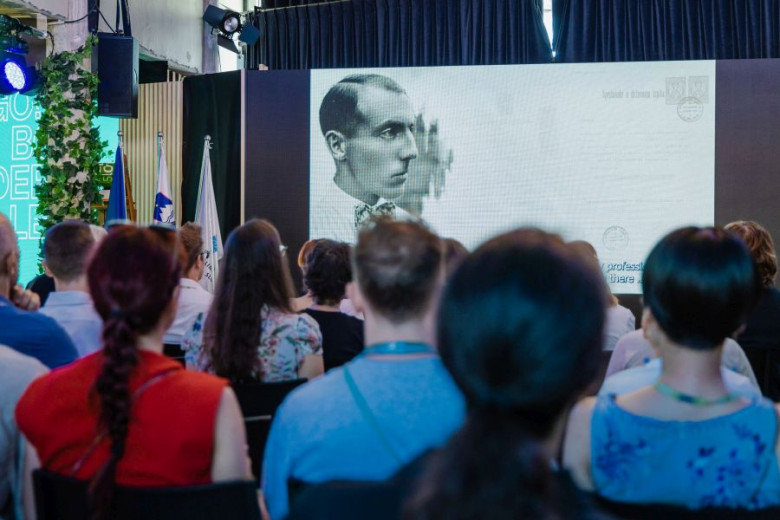 The production of this important historical film used exclusively archival video and photographic material, which, along with other sports and personal legacies, was permanently donated to the Dolenjska Museum in 2019 by Lidija Pauko, Leon Štukelj’s daughter. Photo: Anže Furlan
The production of this important historical film used exclusively archival video and photographic material, which, along with other sports and personal legacies, was permanently donated to the Dolenjska Museum in 2019 by Lidija Pauko, Leon Štukelj’s daughter. Photo: Anže Furlan
-
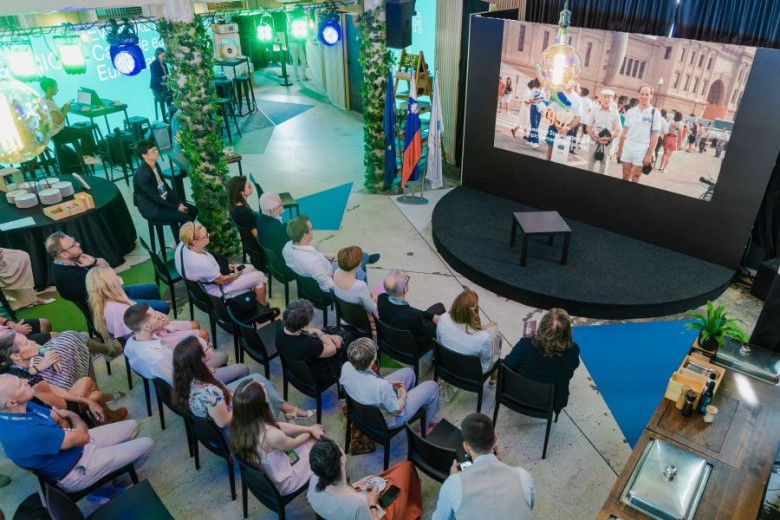 Leon Štukelj believed that sports are not just about competition but a way of life, a love that fills you with energy and passion. Photo: Anže Furlan
Leon Štukelj believed that sports are not just about competition but a way of life, a love that fills you with energy and passion. Photo: Anže Furlan
Collaboration Offers New Opportunities
A roundtable discussion on the connections between culture, tourism and sports followed, featuring Minister of Culture Dr. Asta Vrečko, Mayor of the Municipality of Nova Gorica Samo Turel, Deputy Mayor of Saint-Denis Yannick Caillet, and Head of the European Commission’s Cultural and Creative Industries Group Sylvain Pasqua. The discussion was moderated by Mag. Mija Lorbek, Director of the public institution GO! 2025.
The participants addressed topics related to the integration of sports and culture, the impacts of European Capitals of Culture on local communities, the cultural backdrop of the Olympic Games, and the legacy of such events on local communities.
They shared opinions and experiences on major events, cultural contexts, and lasting impacts or legacies.New cultural connections between France and Slovenia were also fostered by artists from MN Dance Company, project partners from the official GO! 2025 programme, in a performance featuring dancers B-Boy TomiFly (SI) and B-Boy Tchantcho (FR), who combined contemporary and street dance styles. The evening concluded with music by the Slovenian band Manouche. Slovenian Culture Day provided an excellent opportunity to promote Goriška and Slovenia.
-
 The discussion on connecting culture, tourism and sports featured Minister of Culture Dr Asta Vrečko, Mayor of the Municipality of Nova Gorica Samo Turel, Deputy Mayor of Saint-Denis Yannick Caillet, and Head of the European Commission’s Cultural and Creative Industries Group Sylvain Pasqua. Photo: Anže Furlan
The discussion on connecting culture, tourism and sports featured Minister of Culture Dr Asta Vrečko, Mayor of the Municipality of Nova Gorica Samo Turel, Deputy Mayor of Saint-Denis Yannick Caillet, and Head of the European Commission’s Cultural and Creative Industries Group Sylvain Pasqua. Photo: Anže Furlan
Slovenia and France are United by the Olympic Spirit, Solidarity and Friendship
Slovenia and France are united by the Olympic spirit, solidarity and friendship – both in sports and in culture. The two countries are also historically connected through the last French king, Charles X, who is buried in the Bourbon tomb in Kostanjevica, Nova Gorica, while most French kings are buried in the cathedral in Saint-Denis, Paris. The municipalities of Nova Gorica and Saint-Denis will now, following the signing of a cooperation agreement, commit to jointly preserving cultural heritage and collaborating, particularly in culture and tourism.
During the games, Paris is not only the centre of the sporting world, but also a crossroads of various spheres that connect and complement each other.
Paris is also a cultural capital, where Slovenian artists have always sought to present themselves and leave an impression. The Slovenia House in Paris is therefore an excellent opportunity for a broad presentation of Slovenia, its culture, science, cuisine and economy.
The Slovenia House in Paris is one of 40 national houses where countries are represented, while 206 Olympic committees with sports teams are participating in the current Olympic Games.
The Slovenia House has already been recognized and highlighted as one of the top five houses that have generated the most interest among visitors and made the best impression.

